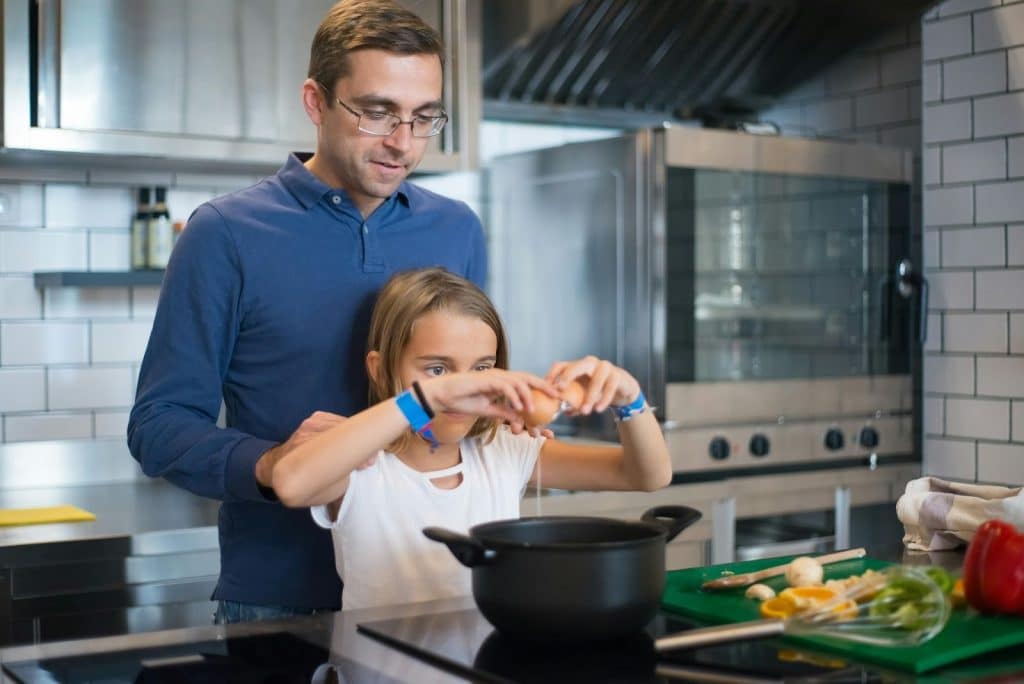
Fatherhood is more than a role, it’s a lifelong influence that shapes how children see themselves and the world. A father’s daily habits, from the way he handles challenges to the respect he shows others, quietly mold a child’s character and future. While no father is perfect, consistent effort makes a powerful difference. These habits don’t require grand gestures, but they do demand presence, intention, and love. Here are 18 fatherly habits that strengthen families and shape children into resilient adults.
Modeling Respect in Everyday Interactions

Children learn respect by watching how their fathers interact with others. Simple gestures, like listening attentively, saying “thank you,” or treating service workers with dignity, teach kids the value of kindness. When fathers consistently model respect, children carry that behavior into friendships, school, and later relationships. Respect demonstrated at home becomes respect practiced in the world.
Demonstrating Emotional Regulation

A strong father shows that emotions are natural but must be managed wisely. Instead of shouting in anger or withdrawing under stress, he demonstrates calm responses. Children then learn that feelings are not weaknesses but opportunities for growth. Emotional regulation builds resilience and empathy. Fathers who model this habit raise children better equipped to navigate life’s challenges.
Encouraging Accountability

When mistakes happen, a father who owns his actions sets a powerful example. Children see that responsibility is not about blame but about integrity. Encouraging accountability means teaching kids to apologize, fix what went wrong, and move forward. This habit instills honesty and self-respect. Families thrive when accountability is the norm, not the exception.
Instilling a Strong Work Ethic

Children absorb the values of dedication and perseverance by watching their fathers work. Whether it’s committing to a job, finishing a household task, or sticking to a goal, effort leaves an impression. A strong work ethic teaches children that success comes from consistency, not shortcuts. This habit prepares them to pursue their own ambitions with determination.
Reading and Learning Together

Fathers who read with their children spark curiosity and imagination. Beyond academics, this habit creates bonding moments that build closeness. Shared learning experiences, whether reading stories, solving puzzles, or exploring new topics, instill a love of discovery. When fathers show that learning is enjoyable, children carry that enthusiasm into school and life.
Creating Family Rituals

Rituals, whether as simple as Saturday breakfasts or annual traditions, create a sense of belonging. These habits give children stability and memories to cherish. Rituals also reinforce the idea that family time is sacred. A father who invests in traditions shows children that relationships are built on consistency. Rituals become anchors in an unpredictable world.
Spending Quality Time Without Distractions

Phones, work, and responsibilities often compete for attention, but a father who gives undivided time sends a clear message: “You matter.” Quality time doesn’t need to be elaborate; it can be a walk, a game, or a conversation. Presence is more valuable than presents. Children thrive when they know they are truly seen and heard.
Expressing Affection Openly

Love is most powerful when expressed. Fathers who show affection through words, hugs, and encouragement teach children that kindness is strength. Open affection builds emotional security and confidence. For sons, it normalizes expressing love; for daughters, it sets expectations of healthy relationships. Affection is not weakness, it is the foundation of connection.
Teaching Financial Responsibility

Money lessons often come from home, and fathers who model wise financial habits equip children for adulthood. Budgeting, saving, and distinguishing between needs and wants become valuable skills. Involving kids in small financial decisions builds confidence. Fathers who practice responsibility create financially literate children ready for independence.
Sharing Practical Life Skills

Life requires more than classroom knowledge. Fathers who teach skills like cooking, fixing a bike, or basic home repairs provide children with independence. These hands-on lessons build confidence and problem-solving ability. Practical skills also create opportunities for bonding. A father’s guidance here prepares children to navigate life with capability and resilience.
Encouraging Independence Through Responsibility

Assigning age-appropriate chores or responsibilities helps children build confidence. Fathers who trust their kids with meaningful tasks send the message: “I believe in you.” Responsibility fosters independence and resilience. When children learn accountability early, they grow into capable adults. Encouraging independence through responsibility creates strong, confident individuals.
Promoting Education as a Priority

A father’s attitude toward education strongly influences his children’s outlook. When he values learning, whether through formal schooling or lifelong curiosity, children adopt the same mindset. Fathers who celebrate effort, not just results, cultivate persistence. Promoting education builds not only knowledge but also discipline. This habit prepares children to embrace growth throughout their lives.
Showing Perseverance During Challenges

Life brings setbacks, but children look to their fathers for cues on how to respond. A father who persists through difficulties, whether in work, health, or relationships, teaches resilience. Perseverance models the truth that challenges are temporary but character endures. Children carry this lesson into their own struggles.
Practicing Consistency and Reliability

Children thrive when they know they can depend on their parents. A father who keeps promises, sticks to routines, and follows through builds security. Reliability demonstrates respect for others’ time and trust. Consistency isn’t about perfection; it’s about being present and dependable. This stability creates a safe foundation for growth.
Balancing Work and Family

Work provides for the family, but presence builds the family. Fathers who balance careers with quality time show children the importance of priorities. Demonstrating that family matters as much as work instills lasting values. Balance prevents resentment and creates stronger connections. This habit ensures children grow up feeling valued and loved.
Handling Conflict Respectfully

Arguments are inevitable, but how they are managed shapes a child’s understanding of relationships. Fathers who resolve conflicts calmly and respectfully model healthy communication. This doesn’t mean avoiding disagreements but handling them without hostility. Children who see respectful conflict resolution learn to approach their own challenges constructively.
Prioritizing Health and Wellness

Children notice how their fathers treat their bodies and minds. Prioritizing fitness, nutrition, and self-care teaches kids that health matters. It also ensures fathers have the energy to stay engaged in their children’s lives. By valuing wellness, fathers model sustainability. Healthy habits set the tone for the entire family.
Living With Integrity

Integrity is one of the strongest legacies a father can pass on. Children observe honesty, fairness, and authenticity in daily life. Living with integrity means aligning actions with values, even when difficult. This habit builds trust and admiration. A father’s integrity becomes a child’s moral compass.
Conclusion

Strong fathers shape strong families through habits practiced daily. From modeling respect and resilience to teaching life skills and values, these actions leave lasting impressions. Parenthood isn’t about perfection, it’s about consistency, presence, and love. When fathers commit to these habits, they don’t just raise children; they shape future leaders, partners, and citizens. In the end, the greatest legacy a father leaves is the example he lives.






Ask Me Anything